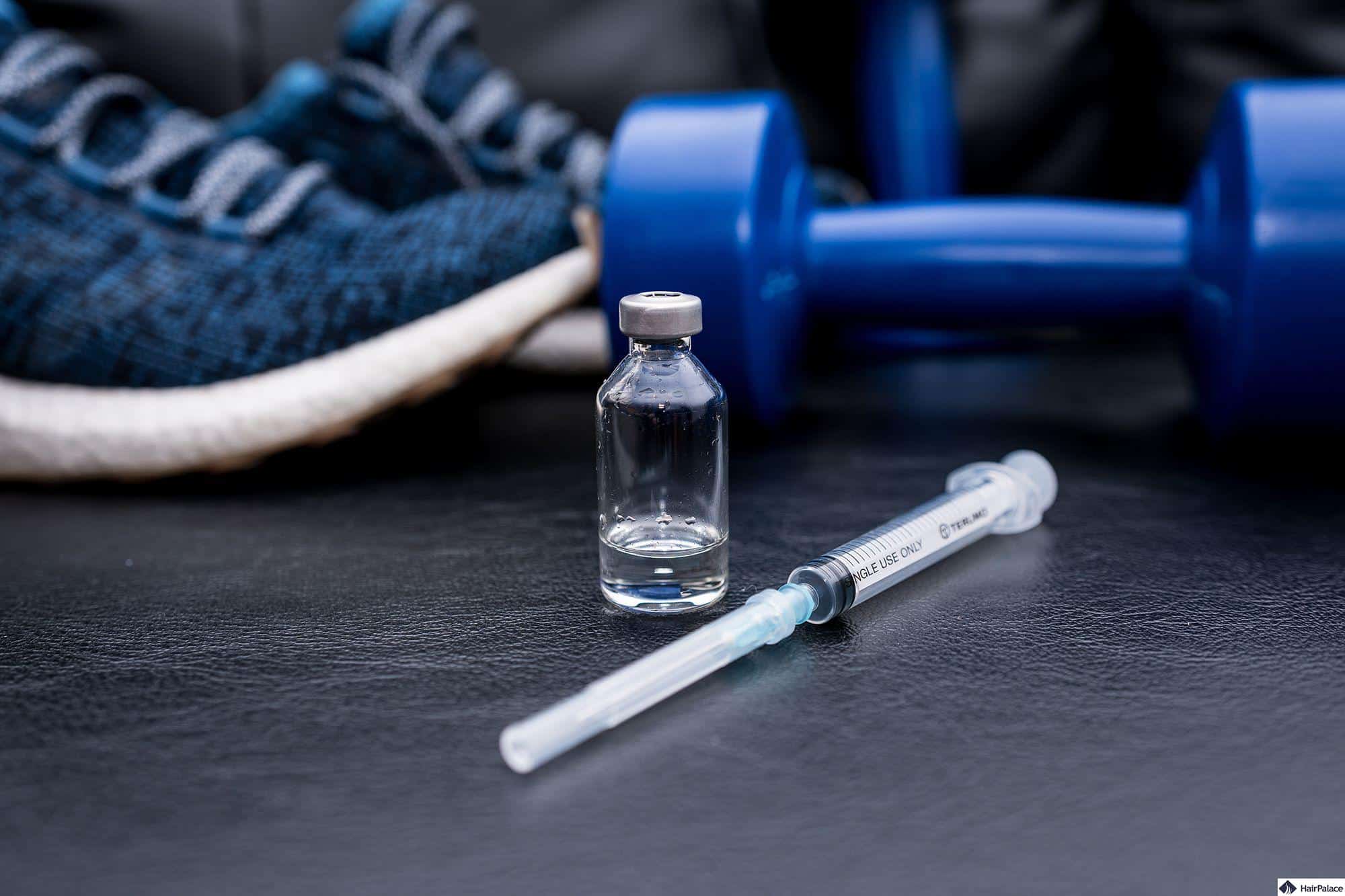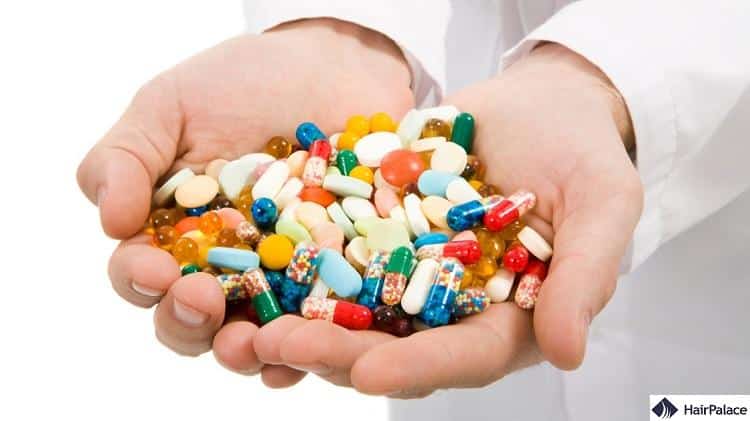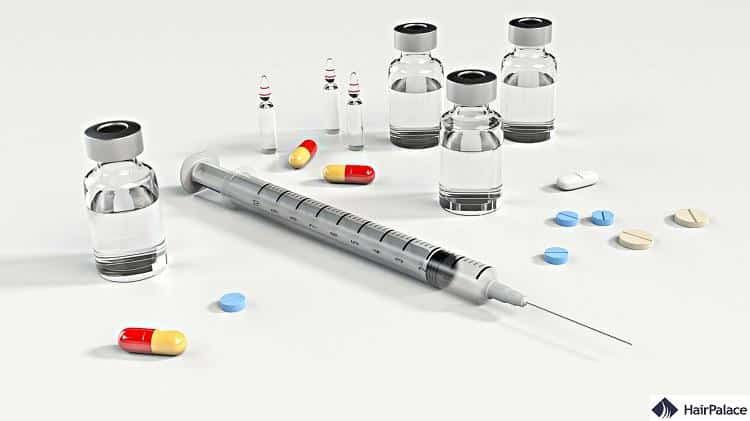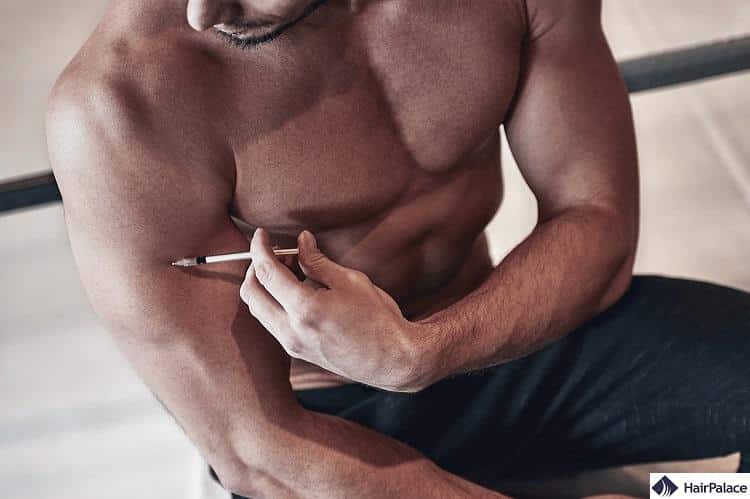Do Steroids Cause Hair Loss?

The use of steroids, while potentially beneficial in certain cases, has been linked to several negative side effects. But do steroids cause hair loss?
Hair loss is one of the most common side effects of steroid use.
This is because steroids can affect hormone levels in the body.
The extent of hair loss caused by steroids depends on the type of steroid being used.
Some steroids are more likely to cause hair loss than others.
Find out everything you need to know about how steroids cause hair loss and what steps you can take to stop hair loss after steroid cycle.
What are steroids?
Steroids are a type of chemical compound that is derived from a group of hormones called androgens.
They are primarily used by athletes, bodybuilders, and people looking to enhance their appearance or performance.
Steroids are synthetic versions of hormones found naturally in the body, such as testosterone.
Anabolic steroids are the most commonly used type of steroid for muscle building.
They can be taken orally or injected directly into the body.
Steroid usage can have both positive and negative effects on the body.
Some of the positive effects include increased muscle mass, strength, and endurance.
These effects can help athletes to perform better in their chosen sport.
Steroid use can also help to reduce body fat, which can help to improve physical appearance.
On the other hand, there are also some negative side effects associated with steroid use.

These include increased blood pressure, increased risk of heart attack and stroke, liver damage, acne, changes in mood, and hair fall as well as behaviour.
In addition, long-term steroid use can lead to infertility, testicular shrinkage, and enlargement of the clitoris in females.
Women may also develop male pattern baldness due to prolonged steroid use.
It is important to note that steroids are illegal in many countries and can lead to serious health consequences including permanent hair loss.
Types of steroids
There are two types of steroids, each with different qualities.

1. Anabolic steroids
Anabolic steroids are mainly used to enhance performance in sports, increase muscle mass, and improve physical appearance.
They can also be used to treat certain medical conditions such as delayed puberty, impotence, and muscle wasting associated with HIV/AIDS.
Anabolic steroids have been abused by athletes and bodybuilders in order to gain a competitive edge.
The use of anabolic steroids can lead to a number of serious side effects.
These include liver damage, high blood pressure, increased risk of stroke and heart attack, and changes in cholesterol levels.
There is also a risk of psychological and behavioural changes, such as increased aggression and violent behaviour.
In addition, long-term use of anabolic steroids can lead to infertility, testicular shrinkage, and the development of male characteristics in females.
Anabolic steroids may also have an impact on the hair growth cycle, and lead to thinning hair in certain cases.
Steroid hair loss is due to the increased testosterone levels, which typically also increase the amount of DHT that gets derived from testosterone.
Increased DHT levels can lead to male pattern hair loss in those that are genetically predisposed to the effects of this hormone.
On the other hand, anabolic steroids can be beneficial in certain medical conditions.
However, the risks associated with their use far outweigh the potential benefits.
Anyone considering the use of anabolic steroids should seek professional medical advice to weigh the risks and benefits and consider alternative treatments such as natural supplements.
2. Corticosteroids
Corticosteroids are a type of medication used to treat a variety of conditions.
Doctors often prescribe steroids of this kind to treat diseases such as asthma, and certain types of cancer.
The most common type of corticosteroid is prednisone, which is taken orally or injected directly into affected areas.
Corticosteroids work by reducing inflammation and suppressing the immune system, allowing the body to heal from an illness or injury.
They are often used to treat hair loss caused by alopecia areata which is a common autoimmune disease.
Corticosteroid use is generally safe, but there are some potential side effects.
These include increased susceptibility to infection, increased risk of osteoporosis, and increased risk of high blood pressure.
Long-term use of corticosteroids can also lead to hormone imbalances, which can cause a variety of symptoms including mood swings, weight gain, and fatigue.
Corticosteroids are an important tool in treating many diseases and conditions.
They can be used to reduce inflammation, suppress the immune system, and reduce the risk of serious complications.
How do steroids cause hair loss
Steroid-induced hair loss can happen in a few different ways.
First, steroids can trigger male-pattern baldness.
This is the most common type of hair loss in men and is caused by a genetic sensitivity to the hormone dihydrotestosterone (DHT).
When someone takes steroids, their body produces more DHT, which can increase hair loss from the scalp, temples, and forehead.
When someone takes steroids, their body may go into a state of shock, which can cause a sudden shedding of hair.
While hair loss after steroid injection is usually temporary, it can be distressing for the person experiencing it.
Which steroids are known to cause hair loss?
If you are genetically prone to or already struggle with the signs of male pattern baldness, it is best to avoid taking the following steroids, as they are more likely to accelerate hair loss:
- Anadrol
- Dianabol
- Masteron
- Primobolan
- Proviron
- Trenbolone
- Winstrol
Will hair loss from steroids grow back?
Your hair may start growing back once you stop taking steroids or switch to a different type.
If you notice steroid-induced hair loss, it’s best to consult a doctor about possible treatments.
However, long-term steroid use can lead to permanent hair loss.
Anabolic steroids, in particular, can increase the levels of DHT, a hormone that contributes to hair loss by shrinking hair follicles.
Once the hair follicles have shrunk, they may no longer be able to produce new hair growth.
Are there any steroids that don’t cause hair loss?
Currently, no steroids are clinically proven to be safe for hair loss.
But in general, the following steroids are considered to be less likely to induce hair loss, especially if they are used in smaller doses:
- Anavar
- Deca-durabolin
- Oral Turinabol
Common side effects of steroids
In recent years, steroids have become increasingly popular as a way to build muscle mass and strength.
While taking steroids can be effective in achieving these goals, they can also have some serious side effects.
One of the most common side effects of steroids is increased aggression due to an increase in certain natural hormones.
This is often referred to as “‘roid rage” and can lead to violent outbursts or verbal abuse.
Long-term steroid use can also lead to permanent physical changes.
Most notably, it can cause the body to produce less testosterone, leading to a decrease in muscle mass and strength.
Additionally, prolonged use can also lead to kidney and liver damage.
Steroids can also cause a number of psychological side effects.
These can range from mood swings to depression and even psychosis. In some cases, these effects can even lead to suicidal thoughts.
Finally, using steroids can also have a number of negative impacts on the user’s physical appearance, including hair growth.
Steroid use can cause acne, hair fall, and changes in skin texture.
It can also lead to gynecomastia, a condition in which men develop enlarged breasts.
Prolonged steroid use may also increase your risk to develop multiple sclerosis and Crohn’s disease.
Overall, while steroids can be a beneficial tool for bodybuilders and athletes, it’s important to be aware of the health and hair loss risks associated with them.
This is especially true if you’re prone to male pattern baldness,
How to prevent hair loss caused by anabolic steroids

Of course, the best way to prevent steroid-induced hair loss is to stop taking steroids.
Along with hair loss, these supplements can have far more serious consequences for your health.
We understand that there may be psychological reasons that you take steroids.
Not everyone is able to stop on their own, talking to a counsellor may help you to recover and stop usage.
3 Treatment options
Hair loss is a common problem, affecting millions of people worldwide. It’s usually a gradual process that leads to a slow shift in the hair cycle.
Fortunately, there are a variety of treatments available for patients experiencing hair loss.
From medications and topical treatments to surgical procedures and lifestyle changes, there are a number of options for people looking to achieve hair regrowth.
1. Medications
One of the most common hair loss treatments is medications.
These treatments come in a few different forms, including topical treatments and oral medications.
Topical treatments are applied directly to the scalp and increase blood flow to the hair follicles.
This means that more nutrients can reach your scalp hair which often reduces hair fall and aids regrowth.
These treatments typically contain minoxidil, which helps to open up the hair follicles, allowing them to produce new hair.
Oral medications, such as finasteride, can also be used to help with hair loss.
These medications work by blocking the production of dihydrotestosterone, the hormone responsible for hair loss.
2. Surgery
Another option for hair loss treatment is surgery.
Hair transplant surgery is one of the most popular options and involves the transplantation of healthy hair follicles from one area of the head to another.
This procedure can be used to restore thinning or balding areas of the entire scalp.
However, hair transplants are mainly effective for men, and women suffering from female pattern baldness often see lacklustre results from the treatment.
Scalp reduction surgery is another option, which involves removing a section of the scalp and then stitching the two remaining sections together.
While this procedure can be effective for some people, it is usually only used as a last resort.
3. Lifestyle Changes
Making lifestyle changes can also help to improve the condition of patients who suffered hair loss.
Eating a balanced diet, getting regular exercise, and reducing stress levels can all help to improve hair health.
Additionally, avoiding harsh chemicals and wearing protective styles can help to reduce the amount of damage done to the scalp or facial hair.
Hair loss can be a difficult problem to deal with, but fortunately, there are a variety of treatments available.
Finding the right treatment for you will depend on the underlying cause of your hair loss and your own personal preferences.
With the right treatment plan, you can restore your hair and have a fuller, healthier look.
Do Steroids Cause Hair Loss – FAQ
The most effective way to stop hair loss is to cease the use of steroids, as they often contribute to hair loss. Consider treatments such as minoxidil (Rogaine) or finasteride (Propecia), which can help reduce hair loss by stimulating hair growth or blocking DHT (a hormone associated with hair loss), respectively.
Nandrolone (Deca Durabolin) is considered a steroid that is less likely to cause hair loss due to its lower androgenic activity compared to other anabolic steroids.
Last medically reviewed on June 5th, 2024
- Albano GD, Amico F, Cocimano G, Liberto A, Maglietta F, Esposito M, et al. Adverse Effects of Anabolic-Androgenic Steroids: A Literature Review. Healthcare [Internet]. 2021 Jan 19;9(1):97. https://doi.org/10.3390/healthcare9010097
- Hoffman JR, Ratamess NA. Medical issues associated with anabolic steroid use: are they exaggerated? J Sports Sci Med. 2006 Jun 1;5(2):182-93. https://www.ncbi.nlm.nih.gov/pmc/articles/PMC3827559/#sec1-8title
- Olsen EA, Carson SC, Turney EA. Systemic steroids with or without 2% topical minoxidil in the treatment of alopecia areata. Arch Dermatol. 1992 Nov;128(11):1467-73.https://pubmed.ncbi.nlm.nih.gov/1444500/
- Schweikert HU, Wilson JD. Regulation of human hair growth by steroid hormones. I. Testerone metabolism in isolated hairs. J Clin Endocrinol Metab. 1974;38:811–819https://pubmed.ncbi.nlm.nih.gov/4823922
- Kaufman KD, Olsen EA, Whiting D, et al. Finasteride in the treatment of men with androgenetic alopecia. Finasteride Male Pattern Hair Loss Study Group. J Am Acad Dermatol. 1998;39(4, Part 1):578–589https://pubmed.ncbi.nlm.nih.gov/9777765


